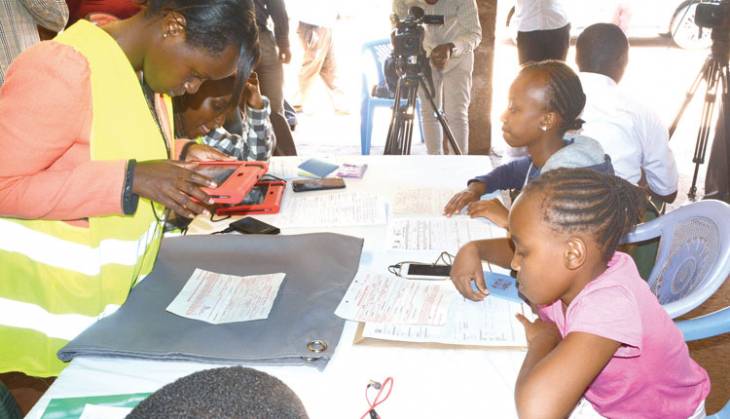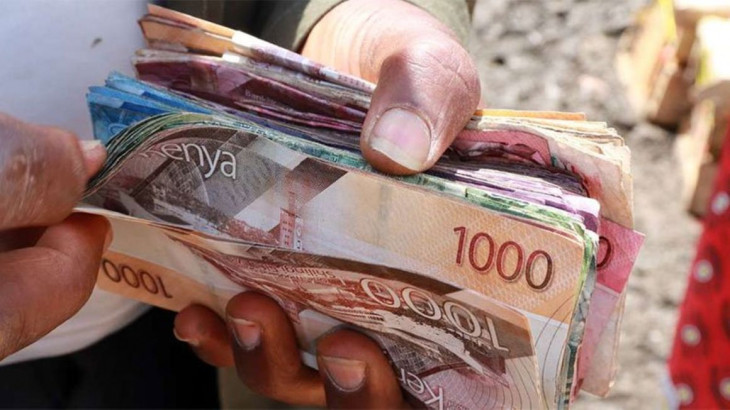Radical proposals in Huduma Namba identification system

Jeremiah Kiplang’at
The national elections agency will be forced to use the Huduma Namba identification system as the source of the main voter register if a proposed bill is passed into law.
Kenyans will also not be allowed to access government services and social protection funds unless they have the Huduma Namba card, the new bill proposes.
The Independent Electoral and Boundaries Commission (IEBC) is already compiling the voter register for next year’s General Election and plans to roll out the final mass registration next month.
However, the agency might be forced to go back to the drawing board if the bill, to be introduced for First Reading at the National Assembly today becomes law.
Other than IEBC, the Kenya Revenue Authority will also be compelled to use the Huduma Namba as its primary document.
The Huduma Bill 2021, makes it mandatory for the IEBC to develop its voter database from the National Integrated Identity Management System (NIIMS), that will be under the control of the Interior ministry.
Personal data
NIIMS is the source for the Huduma Namba that has been made compulsory for all citizens in the proposed law.
The polls agency will be required to retrieve information about eligible voters from the NIIMS for compilation of its comprehensive voter register, before elections because the integrated data system has been made its primary source of information for this purpose.
“This bill seeks to reform the identity ecosystem. It adopts the foundational identity system model.
It establishes the NIIMS, that will be a primary database for both foundational and functional data, from which every other database with personal data of residents in Kenya, such as database of voters, taxes and social services, will be built,” the bill says.
The bill is sponsored by Majority Leader in the National Assembly Amos Kimunya and will be introduced in the House during its Special Sitting today.
MPs are on a long recess but have been summoned to deliberate on a number of proposed laws including the Huduma bill.
To show how important the Huduma Namba is to the electoral body, the IEBC chief executive officer has been included as a critical member of the NIIMS coordination committee.
The committee will be chaired by the Interior Principal Secretary. Its members will be IEBC chief executive, Commissioner-General of KRA, Director General National Intelligence Service, Inspector General of Police and Principal Secretaries in the Treasury, Education and Health. The committee’s main role will be to coordinate NIIMS activities.
Tough penalties
The bill also sets severe penalties for those who fail to enroll for Huduma Namba that has elicited controversy in the past after the Interior ministry made it mandatory for acquisition by all citizens.
The Bill stipulates tough penalties including a Sh10,000 fine for those who fail to register for the document or present their children for registration.
The bill’s main objective is to establish the NIIMS that will be the country’s main data register for all citizens.
From the register, the government will present every citizen with a unique identification number that will be referred to as Huduma Namba.
The Bill says that the Namba will be carried in a Huduma Card that will be given to anyone who is above 18 years.
For children born after the law has come into force will be required to acquire Huduma Namba at birth.
If the Bill becomes law, anyone seeking services in any public office will be required to present the Huduma Namba card instead of the current National Identification (IDs) card.
“The presentation of the Huduma card issued under this Act shall constitute sufficient proof of identity to facilitate access (to) any public service which may require an official identification to conduct private transactions,” says the Bill.
Huduma Namba has been a source of controversy pitting the government and opponents since it was launched in 2019.
It has been a source of political fodder as Interior Cabinet Secretary Fred Matiang’i clashed with Deputy President William Ruto’s allies,who have raised issues with the way the government has been rolling it out.
They have sensationally claimed it was part of a plot to rig the 2022 elections.
However, Matiang’i and his ICT counterpart Joe Mucheru have dismissed the concerns and implored Kenyans to ignore its opponents, warning that those who failed to acquire the document risked being denied critical public services.
Controversy over Huduma Namba has found its way to the courts and last October, the High Court declared its rollout illegal for contravening the Data Protection Act following a petition by the Katiba Institute.
The court asked the government to align the process with existing laws before it proceeds to register more Kenyans. Attorney-General Kihara Kariuki has appealed the ruling.
Despite the challenges, Kimunya, who as the Majority Leader often sponsors government Bills, has promoted the bill, saying it will create an efficient identity system that will present opportunities for fiscal savings, development of a digital economy and hasten service delivery.
For every government institution, the NIIMS will be the main source of information to identify Kenyans who visit them for services.
“Any government agency which requires personal particulars of a resident individual in order to provide a service shall, at the first instance, rely on the NIIMS database to authenticate the functional date of such individual,” says the proposed law.
Other key institutions, such as the National Hospital Insurance Fund and National Social Security Fund, among others, will be expected to capitalise on the system for their own databases.
The proposed law pokes holes on the existing IDs as it touts the Huduma card, saying the former did not carry comprehensive information about holders even though it has been a singular primary identification for Kenyans since independence.
To cure this, the Huduma Card is touted as its perfect replacement as it will contain biometric data and will be the central entry point for anyone seeking information on any individual.
Perfect replacement
“The national ID, despite having all the personal data details, including biometrics, has very little utility in functional areas.
The failure to have linkage between foundational and functional systems has led to duplication in registrations of persons, wastage of resources and diminution of trust in the identity ecosystem,” the Bill reveals.
To get registered into NIIMs, one will be required to present their full name, date and place of birth, gender, photograph of prescribed size, biometric data and also state their nationality.
They will also be expected to give their phone number, email address and addresses of the place they reside.
Last June, the National Treasury revealed it had set aside Sh1 billion for the second round of Huduma Namba registration, after it failed to hit its target during the first rollout in 2019 when it registered 38 million.
That allocation shot up the total cost of the registration to Sh10.6 billion.













